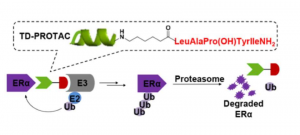Peptide modulators targeting protein-protein interactions (PPIs) exhibit greater potential than small-molecule drugs in several important aspects including facile modification and relative large contact surface area. Stabilized peptides constructed by variable chemistry methods exhibit improved peptide stability and cell permeability than the linears. Herein, we designed a stabilized peptide-based proteolysis-targeting chimera (PROTAC) targeting estrogen receptor α (ERα) by tethering an N-terminal aspartic acid cross-linked stabilized peptide ERα modulator (TD-PERM) with a pentapeptide that binds the Von Hippel-Lindau (VHL) E3 ubiquitin ligase complex. The resulting heterobifunctional peptide (TD-PROTAC) selectively recruits ERα to the VHL E3 ligase complex, leading to the degradation of ERα in a proteasome-dependent manner. Compared with the control peptides, TD-PROTAC shows significantly enhanced activities in reducing the transcription of the ERα-downstream genes and inhibiting the proliferation of ERα-positive breast cancer cells. In addition, in vivo experiments indicate that TD-PROTAC leads to tumor regression in the MCF-7 mouse xenograft model. This work is a successful attempt to construct PROTACs based on cell-permeable stabilized peptides, which significantly broadens the chemical space of PROTACs and stabilized peptides.
